My post contain affiliate links. This means I may receive a small commission when you make a purchase after clicking select links. Rest assured that this does not change or affect the prices you pay. All opinions expressed on this site are my own.

Being aware of some legal dealings in the world at large isn’t likely new to any of us. However, legal technicalities can literally impact your blog. Initially, I thought, what a bummer – can’t a blog about fashion and motherhood be “free” of legal jargon to keep things easy peasy? After all – “I don’t need backups. I’m going to Harvard” said Elle Wood in Legally Blonde. This was my first thought too, “what back-up plan? It’s only a blog. I don’t need a back up plan.”
Unfortunately, sadly and truthfully, the answer is no. Not everything is easily fixable like in a 2-hour movie Legally Blonde – Elle Wood’s world. You’ll want to “just bend and–snap” for the right reasons. However, getting snapped at for the wrong reasons is going to be very financially painful; especially when it comes to the law.
As an experienced wedding planner, I am familiar with the risks and liabilities of weddings and events. I look for things like tripping extension cord hazards, potential candle fire risks, backup plans in case the wedding bands are lost, etc. I’m always looking out for the best interest of my clients. So, why wouldn’t I do the same for my Slightly Petite blog right from the start? Why wouldn’t I invest in my blog to ensure that things are set up properly? After all, right now it might be a small personal blog. But one day, it could evolve into something bigger. I’m a firm believer in doing it right the first time around. Therefore getting these legal items taken care of now will hopefully mitigate any headaches in the future.
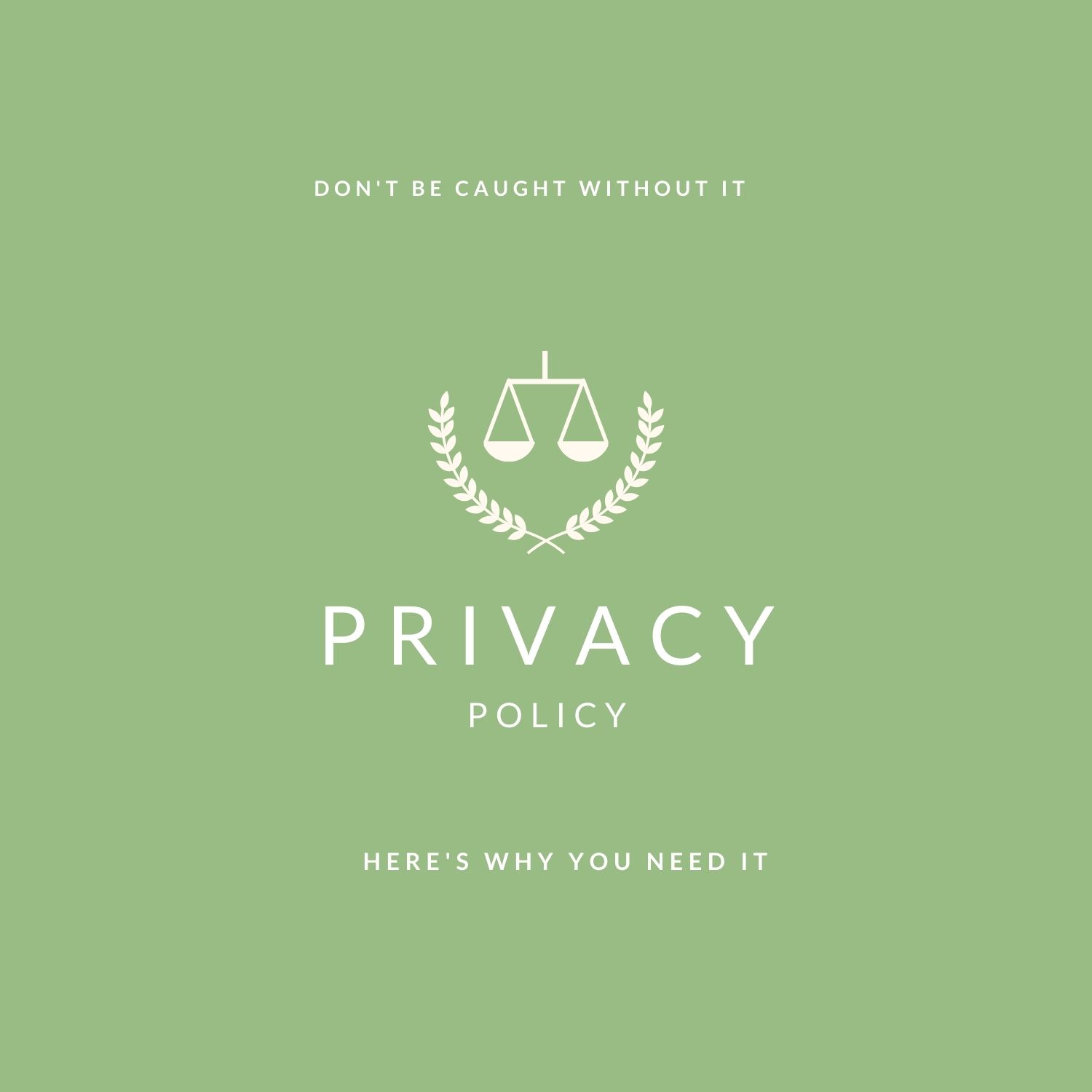
Privacy Policy
When I started researching and delving into the world of blogging, I came to appreciate that there is a lot more to blogging than just words on a screen. Around 2014, Canada was the first to put anti-spam legislation in place. In my wedding business, this privacy policy needed to be addressed so that I was compliant with sending commercial electronic messages and making “cold” calls to potential clients.
The basic process of collecting personal information became the first task that I needed to understand and ensure compliance. This email collection process is also shared by a vast array of other creative entrepreneurs. So, this privacy policy information is vital to many businesses. A privacy policy is now required by ALL bloggers in North America and I would presume globally moving forward.
Many bloggers utilize email management systems (Mailchimp, Convertkit, etc.). You are required by law to have a privacy policy on your blog whenever you collect personal information from your website visitors. There are different blogging rules and regulations that require this such as:
· EU’s General Data Protection Regulation (GDPR),
· Federal Trade Commission (FTC),
· California Online Protection Act (CalOPPA),
· Children’s Online Privacy Protection Act (COPPA),
· CAN-SPAM Act,
· Amongst others.
A privacy policy on your blog should explain to your visitors what personal information you are collecting from them and how you are going to use it. Even if it’s just a small humble blog, you may likely still be collecting personal information and need to have a privacy policy to comply with the law.
Personal information that you might collect from your website visitors may include:
· Name
· Email address
· Gender
· Age
· Phone number
· and more.
But what if you don’t have an email management system? Well, there are other ways you might inadvertently be collecting personal information from your website visitors, such as via Google Analytics, cookies, Google AdSense, etc. These are tracking and sales tools that can capture personal information.
Not handling personal information appropriately can be associated with hefty fines from privacy policy lawsuits – running into the 10’s of 1000s’ of dollars. So, “if you’re going to let one stupid prick ruin your life, you’re not the girl I thought you were,” said Professor Stromwell from Legally Blonde. I doubt any new blogger or small business would want to risk being fined or sued. The quickest way to get your privacy policy in place, is with the use of legal templates. If you want more information, you click here.
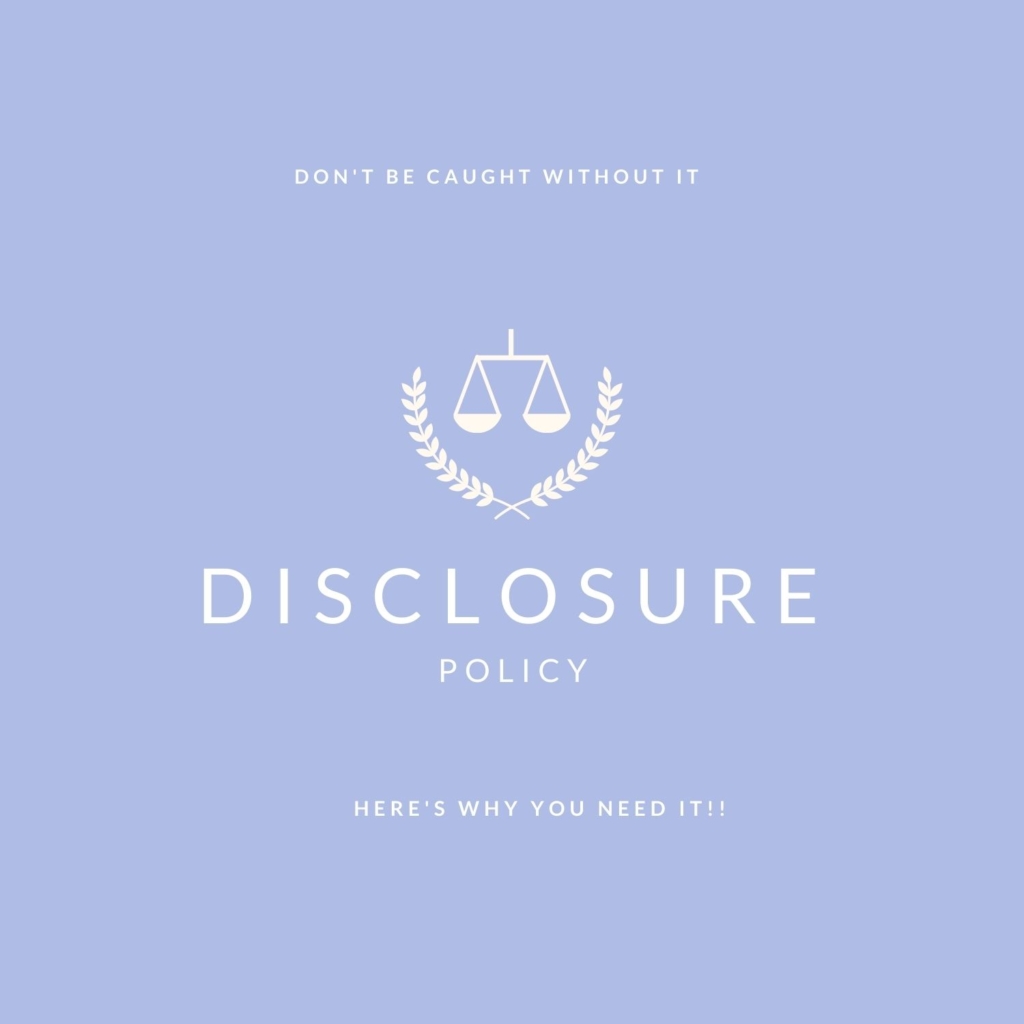
Disclosure Policy
I remember hearing about this disclosure issue with the Kardashians a few years ago from the news. Apparently, a consumer watchdog group in 2016, found over 100 Instagram posts that were paid product placements without being marked as advertising. The Kardashians had a week to take those posts down, or the watchdog group was going to notify the Federal Trade Commission (FTC), which in turn could open an official investigation. The group found undisclosed product placement on the Instagram accounts of five Kardashian siblings, which collectively advertised more than two dozen companies without proper disclosures. This is another area of legal compliance that needs to occur if you are promoting products.
This is just one example of how small blogs and even huge corporations need to be on the same side of the law. Dire financial consequences can be faced no matter the amount of traffic your blog generates if you do not have a disclosure policy.
The FTC enforces federal consumer protection laws that prevent fraud, deception and unfair business practices. This essentially means that you are mandated to disclose your affiliate relationships, sponsorships, and any other endorsements you received to ensure transparency, honesty, and prevent misleading advertising for your readers. Not only is this the law, but it is also just good practice. Your readers are looking for you to act in their best interests. They need to make a well-informed decision on their own, so knowing all the facts is imperative. Your readers don’t want to be “manipulated”.
Here are some examples of the need for disclosure:
- Articles with affiliate links where you earn commissions if someone purchases through your link
- Sponsored posts for which you were compensated, or
- Content for which you receive free products, discounts, or anything else in exchange.
Likewise, you’ll need disclosure on your social media posts for the same reasons above. Elle Woods from Legally Blonde said that “I feel comfortable using legal jargon in everyday life. [whistle] I object!” and so can you. A legal template is an easy way to ensure that you are on your way to compliance. Many times a disclosure and disclaimer policy are featured on the same page. For further assistance with your disclosure policy, please click here.
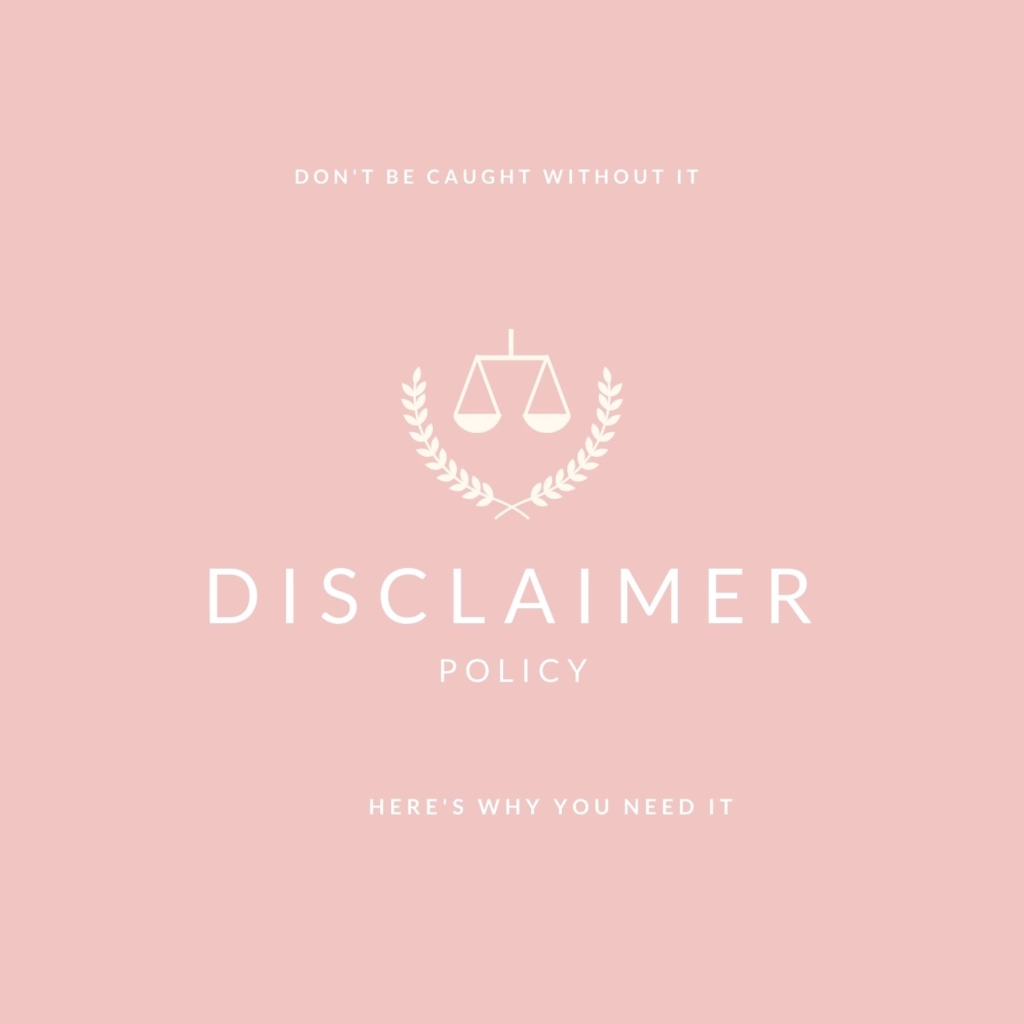
Disclaimer Policy
A disclaimer is a waiver of your responsibility. Essentially, a disclaimer is a statement that attempts to limit your liability in terms of responsibility for an outcome based on what information your reader obtained from your blog, and what action(s) your reader took as a result of that information.
Blog disclaimers are NOT the same thing as blog disclosures. A blog disclaimer is where you “disclaim” or “deny” legal liability for the content you publish on your blog to protect yourself from lawsuits.
Every blog needs a disclaimer because you don’t want to be legally held responsible for anything you publish on your blog.
Unfortunately, some readers may feel that what you write is the gospel truth. “Whoever said orange is the new pink was seriously disturbed” according to Elle Woods in Legally Blonde. What happens if people who said that orange is the new pink were classified as “seriously disturbed” and were then jailed? Ok – so I might be over-exaggerating but hopefully, this will help you understand things a bit more clearly.
The content of your blog might “cause” something to someone in a harmful manner. It could be because the content becomes outdated or contained errors. Honestly, you don’t want anyone to rely solely on your information and sue you later for their bad outcome. Your readers should be responsible for their own informed decisions.
When Elle Woods handed someone her resume and the response was “it’s pink”. She said “Oh, and it’s scented! I think it gives it a little something extra, don’t you think?” Before you start adding your own unique spin on something and publishing it in your blog, ensure that you have a disclaimer policy. For a template on disclaimer policy, you can click here.
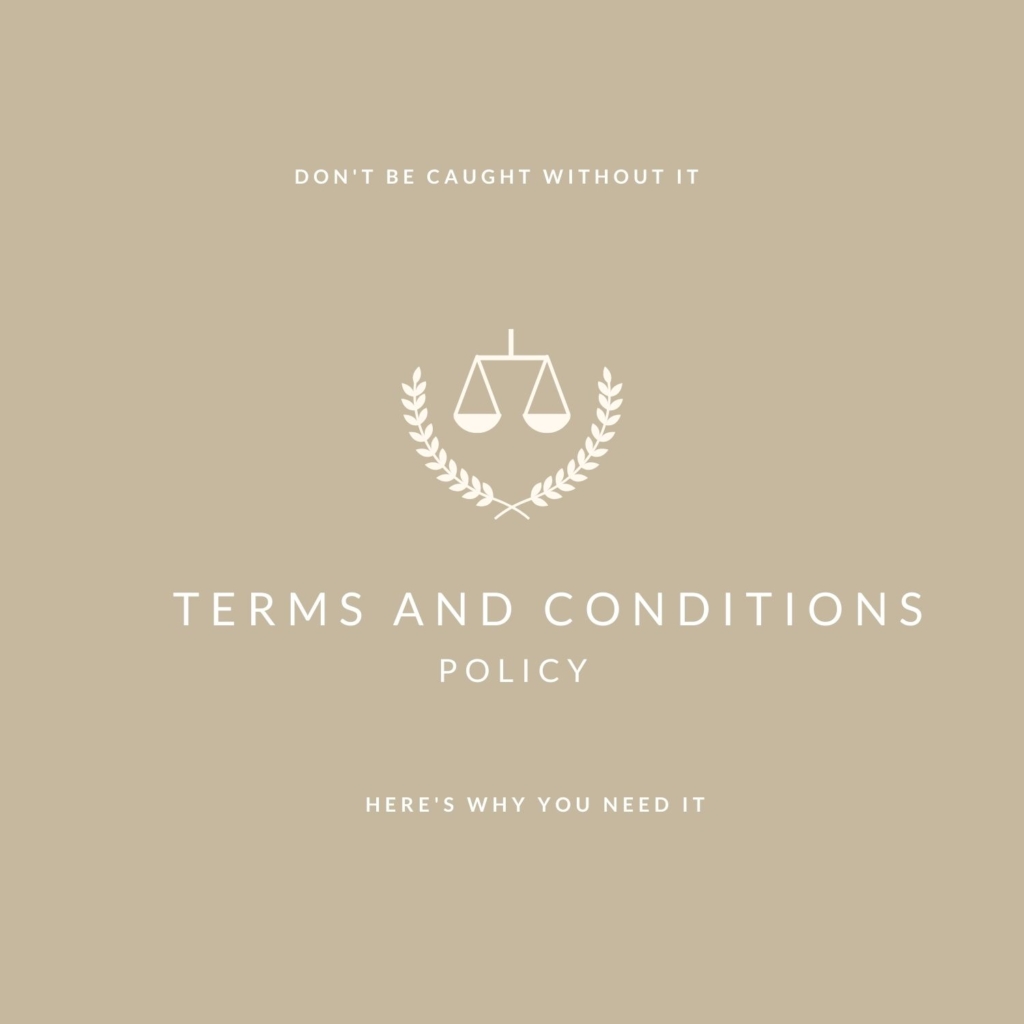
Terms and Conditions
Terms and conditions list out the understanding between you and your blog, and your readers.
It is basically an agreement that sets out the rights and responsibilities of both parties. To utilize your blog, your users must first agree to abide by your terms and conditions. Your readers must act in a manner that is in keeping with your terms and conditions. These are the rules of your blog.
Blog terms and conditions are your website rules. It can include a list of “do’s and don’ts” or general guidelines to be followed by readers. Here are few examples:
· What type of reader generated content can be shared on your website, and if someone posts something contrary, then you can take it down
· Can your content be taken and posted elsewhere for copyright purposes
· Outlining a cookie clause that summarizes how your website uses cookies
For additional resources such as a template for terms and conditions policy, please click here.
Where to get more legal help…
There were several resources that I spent hours upon hours combing through and trying to understand what I needed and how things should be phrased. I’ve got a few friends who are lawyers but as you can imagine, even at the “friends and family” discounted rates, costs can easily exceed what I was hoping to spend since this blog wasn’t producing a profit right out of the gate.
Furthermore, they weren’t practicing law in the creative domain realm so how would they truly understand my needs as a blogger or small business?
This is when I came across Amira from A Self Guru. She’s an actual practicing lawyer in the USA so she should really know her legal stuff. When I connected with her team, they told me that the templates were just as good for me since I’m located in Canada. She’s got some wonderful, easy-to-use policy template bundles that are all ready to go.
Not only are they straightforward to understand, she takes the feeling of being overwhelmed by the legal jargon out. I think of Amira like an Elle Woods when it comes to the legal details. It’s like Elle saying “Oh, I like your outfit, too, except when I dress up as a frigid b*tch, I try not to look so constipated.” Amira knows what legal outfit your blog needs when it comes to the policies, so that you can help protect yourself legally without getting you getting all twisted up in the process.
For further information about privacy, disclosure, disclaimer, terms and conditions policies PLUS A WHOLE LOT MORE – please check Amira’s templates out at A Self Guru by clicking on this link. I’m positive you will learn a thing or two!!
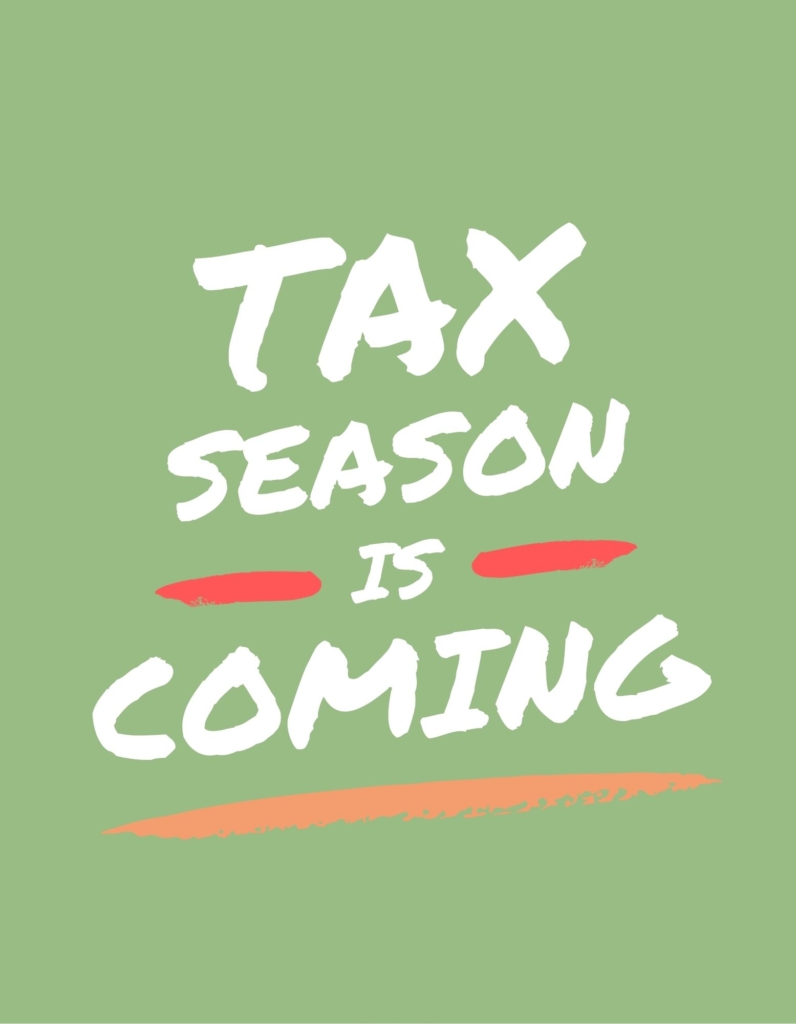
The other thing that’s worthy to mention is accounting and bookkeeping for bloggers and small business. For more information about this topic, please click here.
Please continue to follow my blog by clicking here. New posts about fashion and motherhood will be sent to you automatically so you won’t have to miss a thing.
I wish you lots of success on your blogging journey!
Slightly Petite, Wendy






[…] what other basic legal requirements small businesses running a website or blog should have, please click here to read the blog […]